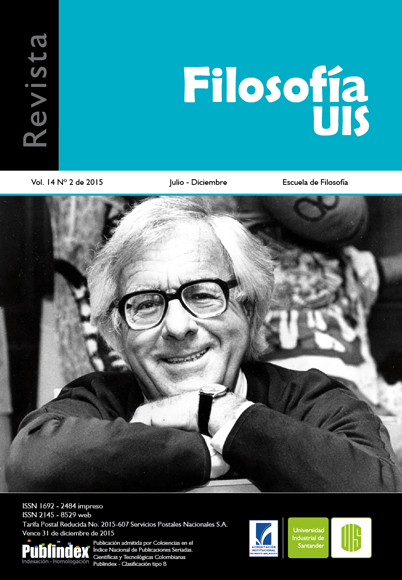Research Article
Published 2015-12-03
Keywords
- Logical pluralism,
- logical consequence,
- relativism,
- monism
How to Cite
Vásquez Dávila, O. (2015). The scopes of logical pluralism. Revista Filosofía UIS, 14(2), 69–81. https://doi.org/10.18273/revfil.v14n2-2015003
Copyright (c) 2015 Omar Vásquez Dávila

This work is licensed under a Creative Commons Attribution 4.0 International License.
Abstract
According to logical pluralism there is not one true logic, there are many. The most well-known pluralism is the view defended by J.C. Beall and Greg Restall. They are pluralists about logical consequence. In this paper, I adhere to the logical pluralism but I hold that the Beall-Restall pluralism has many unsolved problems. I will show that there are important reasons to search for another kind of pluralism.
Downloads
Download data is not yet available.
References
- Beall, J.C. y Restall, G. (1999). “Defending Logical Pluralism”, en Brown, B. y J. Woods (eds.) Logical consequence: rival approaches, Stanmore: Hermes, 2001, pp. 1-22.
- Beall, J.C. y Restall, G. (2000). “Logical Pluralism”. Australasian Journal of Philosophy. 78. pp. 475-493.
- Beall, J.C. y Restall, G. (2006). Logical Pluralism. Oxford: Oxford University Press.
- Cook, R. (2010). “Let a Thousand Flowers Bloom”. Philosophy Compass. 5/6. pp. 492-504.
- Mortensen, C. (1983). “The validity of disyunctive syllogism is not so easily proved”. Notre Dame Journal of Formal Logic. 24. pp. 35-40.
- Priest, G. (2008). Introduction to non-classical logic: from if to is. Oxford University Press.
- Quine, W.V.O. (1970). “Deviant logics”. En Philosophy of Logic. New Jersey: Prentice Hall, cap. 6).
- Read, S. (2006). “Monism: The One True Logic”. En DeVidi, D. and T. Kenyon (eds.). A Logical Approach to Philosophy: Essays in Honour of Graham Solomon, Springer 2006, 193-209.
- Varzi, A. (2002). “On Logical Relativity”. Philosophical Issues. 10. pp. 197-219.
